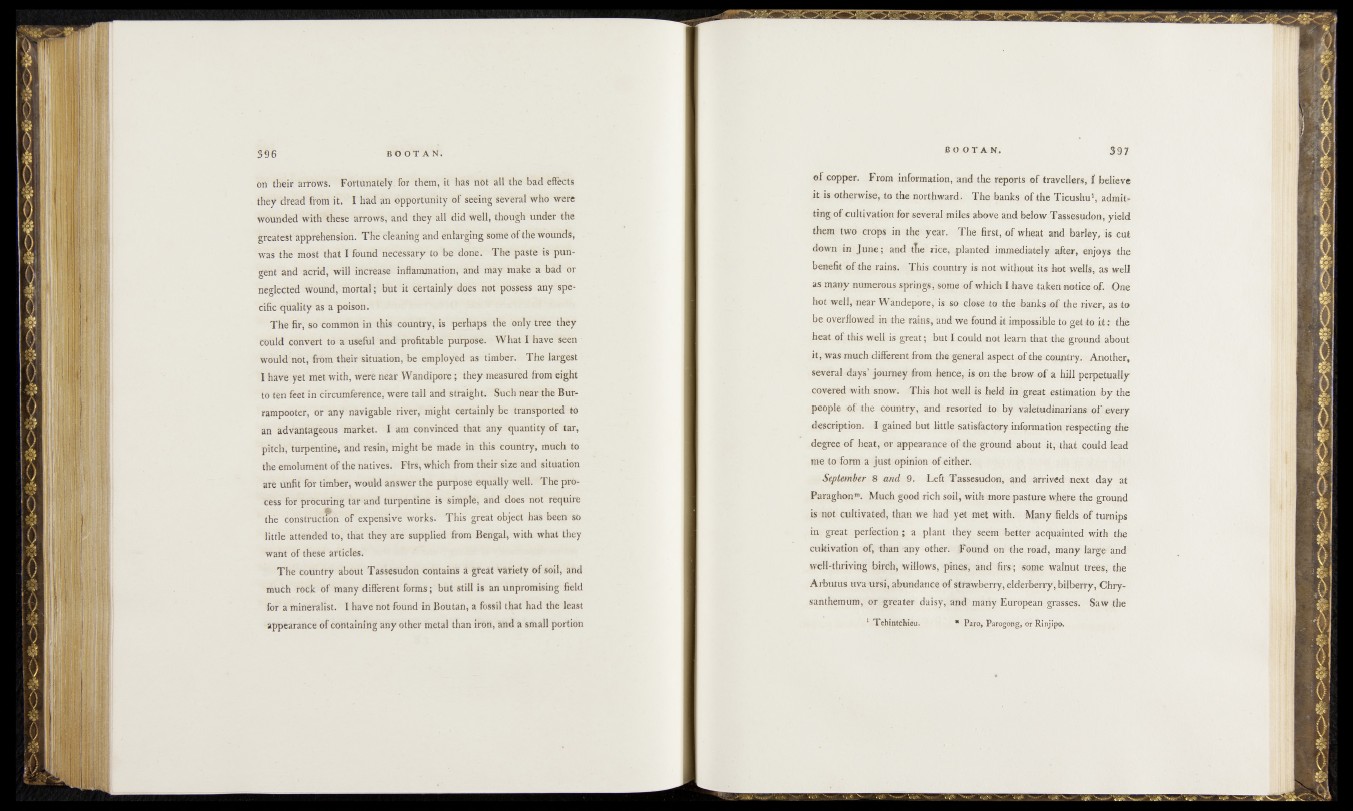
on their. artfowS. Fortunately. fof them, it has not ail the bad effects
they'dread from it. I had an opportunity of seeing several who were
wounded with these arrows, and they all did well, though under the
greatest apprehension. The cleaning and enlarging some of the wounds,
was the most that I found necessary to be done. The paste is pungent
and acrid, Will increase inflammation, and may make a bad or
neglected wound, mortal ; but it certainly does not possess any spe*
cific quality as a poison.
The fir, so common in this country, is perhaps the only tree they
COUld convert to a useful and profitable purpose. What I have Seen
would not, from their situation, be employed as timber. The largest
1 have yet met with, were near Wandipore; they measured from eight
to ten feet in circumference, were tall and straight. Such near the Bun-
rattpoater, or any navigable river, might certainly be transported to
an advantageous market. I am convinced that any quantity of tar,
pitch, turpentine, and resin, might be made in this Country, much to
the emolument of the natives. Firs, which from their size and situation
are unfit for timber, would answer the purpose equally Well. The process
For procuring tar and turpentine is simple, and does not require
the construction of expensive works. This great object has been so
little attended to, that they are supplied from Bengal, with what they
want of these articles.
The couhtry about Tassesudotx contains a great variety of soil, and
much rode of many different forms; but still is an unpromising field
for a mineralist. I have not found in Boutan, a fossil that had the least
appearance of containing any other metal than Iron, and a small portion
of copper. From information, and the reports of travellers, 1 believe
iit is otherwise, to the north-ward. The banks o f the Tieushu1, admit.
ting of cultivation for several miles above and below Tassesudpn, yield
them two crops in the year. The first, o f wheat and barley, is cut
down in June5 and the rice, planted immediately after, enjoys the
benefit of the rains. This country is not without its bat welts, as well
ass many numerous springs, some o f which i have taken notice of. One
hot well, near Wandepore, is so close to the banks o f the river, as to
be overflowed in the rain*, and we found it impossible to get to i t : the
heat of ibis well is .gnat; but I could mot lettra that the ground about
it, was much different from the general aspect of the country. Another,
several days’ journey from hence, is on the brow o f a hjjU perpetually
covered with snow. This hot well is held in great estimation b y the
people o f the -country, and resorted to by valetudinarians o f every
description, i gained but little satisfactory information res-peeting the
degree of heat, or appearance of the ground about it , that could lead
me to form a just opinion of either.
September 8 and 9. Left Tassesudon, and arrived next day at
Paraghon*". Much good rich soil, with more pasture where the ground
is not cultivated, than we had yet met with. Many fields of turnips
in great perfection; a plant they seem better acquainted with the
cultivation of, -than any other. Found on -die road, many large and
well-thriving birch, willows, pines, and firs-; some walnut trees, the
Arbutus uva -ursi, abundance of strawberry, elderberry, biberry, Chrysanthemum,
or great«- daisy, and many European grasses^ Saw the
Tehintchieu. * Paro, Parogong, or Rinjipo.